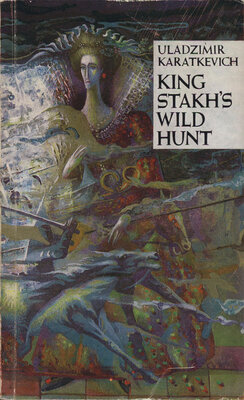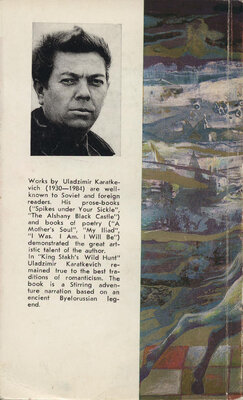King Stakh's Wild Hunt
Уладзімір Караткевіч
Выдавец: Мастацкая літаратура
Памер: 248с.
Мінск 1989
“Miss Nadzeya, may I invite you for the waltz?”
She hesitated a moment, shyly raising her fluffy eyebrows.
“I was taught it some time ago, and have probably forgotten.”
She put her hand, put it somewhat awkwardly, under my shoulder. At first I thought we would be a laughing-stock for everybody in the ball-room, but was soon set at ease. I had never met such a light dancer as this girl. She did not dance, she flew about in the air, and I almost carried her along on the floor. And that was easy to do, since she was as light as a feather. Approximately in the middle of the dance I noticed her face that had been concentrated and uncertain, becoming suddenly simple and very sweet. Her eyes sparkled, her lower lip somewhat protruding.
Then we danced some more. She became surprisingly lively, her cheeks became rosy, and in this intoxication such youth sparkled in her face, that a warmth filled my heart.
“This is me,” her soul seemed to be saying in her eyes, in her big, black and shining eyes, “this is me. You thought me far away, but I am here, here I am. In this one short evening 1 have shown you myself, and you are surprised. You didn’t consider me a living being, found me pale and bloodless, as the sprout of a dahlia in a dungeon, but you have taken me out into the world. I’m so grateful to you, you are so kind. You see live verdure has appeared in my stem, and soon if the sun warms me, I’ll show the world my wonderful scarlet flower. But there’s one thing that you must not do, you mustn’t carry me back into the cellar.”
It was strange to see in her eyes a reflection of the joy that she felt on sensing her own full value. I, too, was carried away by this, and my eyes, probably, began to shine. My surroundings I saw only out of the corner of my eyes.
And suddenly the squirrel whisked back into its hollow, the joy disappeared from the eyes, and the former horror settled behind her eyelashes: Varona was giving orders to lackeys who were hanging the portrait of Roman the Elder above the fireplace.
The music stopped. Dubatowk came up to us, red in the face and merry.
“Nadzeya, my beauty. Allow an old fool your little paw.”
He lowered himself heavily on a knee and, laughing, kissed her hand.
In a minute he spoke in an altogether different tone:
“According to the law a guardian must make his report immediately upon his ward’s reaching the age of 18.”
He withdrew from his pocket an enormous bulbous enamelled silver watch and, becoming official, declared:
“It is seven o’clock. We are going to make known our report: I shall speak; then, for the second guardian, Mr. Kalatech-Kazlowsky,— who lives in town and due to illness could not come,— an arrangement has been made that Saava Stakhowsky and Mr. Ahlyes Varona will speak in his stead. And an independent witness is necessary.” His eyes rested on me searchingly. “You’re just the man. You are a young man yet, and will live long yet: you will be able then to bear witness to the fact that everything was carried out here according to the old customs and to the dictates of conscience. Miss Yanowskaya, please come together with us.”
Our conference did not last long. At first an inventory of the property was read — the real estate and the personal property — that was left, according to the last will and testament of
her father. It turned out that it consisted mainly of the castle and the park, the entailed estate, from which not a single thing might vanish and which had to be kept up in such a way as to maintain the greatness of the family and its honour.
“A fine honour!” I thought. “The honour of dying of hunger in a wealthy house.”
Dubatowk proved that the real estate property had been well looked after and retained intact.
Next was the question of profits. Dubatowk announced that the money invested by Roman Yanowsky — 24,000 roubles — in two banking offices, at 8 % without the right to touch the basic capital, returned from 150 to 170 roubles monthly. This profit, due to the efforts of the guardian, even increased. Moreover, the basic capital had increased by a sum which, if it were so wished, could be added to the dowry of the heiress. All the people there shook their heads. The profits were scanty, especially if the necessity of running the house and keeping it in order were taken into consideration.
“And how are the servants paid?” I asked.
“A part of the inheritance is allotted for that in the will, as they are an inseparable part of the entailed estate.”
“I would ask Mr. Dubatowk to explain to me how things stand with the leased land belonging to the Marsh Firs estate,” said Saava Stakhowsky, a small thin man with such sharp knees it seemed they were on the point of cutting through his little trousers. He evidently always exchanged caustic remarks with Dubatowk and now asked him this venomous question. Dubatowk, however, wasn’t taken aback, he pulled out large silver spectacles, a kerchief
which he spread out on his knees, then a key and only after that a scrap of paper. His spectacles, however, he did not put on, and began to read:
“Miss Yanowskaya’s great-grandfather had 10,000 dessiatinas * of good arable land, without including the forest. Miss Yanowskaya, as you probably know, most respected Mr. Stakhowsky, has 50 dessiatinas of arable land, considerably impoverished. She has also the park which doesn’t give any returns, and the virgin forest, which is also effectively an entailed estate, as it is a Forest Reservation. Frankly speaking, this rule could be waived. However, firstly, access for the wood-cutter to the virgin forest is impossible because of the quagmire. And secondly, would it be wise? Nadzeya may have children. What could they do with 50 dessiatinas of poor land? Then the family will come to a complete downfall. Of course, the young lady is now grown-up, she can decide for herself...”
“I quite agree with you, Uncle,” Yanowskaya said, blushing and almost in tears. “Let the virgin forest stand. I’m glad that one can get to it only by small paths, and at that only in dry weather. A pity to destroy such a dense forest. Virgin forests are God’s gardens.”
“That’s right,” continued her guardian, “besides, almost the entire Yanowsky region is but a quagmire, a peat-bog and waste land on which nothing besides heather can grow. No one has ever lived on this land, as long as man can remember. And that means that we take only the 50 dessiatinas which are rented out for half the
* Dessiatina — a measure of land equal to 2.7 English acres, or LI hectares.
crop. The land isn’t fertilized, only rye is planted on it, and it gives 330, at the most 40 poods * per dessiatina, which means that a dessiatina gives an income of 10 roubles a year, and thus, from all the land, 500 roubles annually. And that is all. This money is not withheld, you can believe me, Mr. Stakhowsky.”
I shook my head. The landlady of a large estate had a monthly income of a little over 200 roubles. While an average official received 125 roubles. Yanowskaya had a place to live in and food to eat, nevertheless it was undisguised need, a need without a ray of hope. I, a learned man and a journalist, the author of four books, received 400 roubles monthly. And I didn’t have to put it all into this hole — the castle, to make presents to the servants, to keep the park in relative order. 1 was Croesus in comparison with her.
I felt sorry for her, this child, on whose shoulders had fallen such an overwhelming load.
“You are rather poor,” Dubatowk said sadly. “As a matter of fact, after all the necessary expenses, you have only kopecks left on hand.”
And he glanced in my direction very expressively and meaningfully, but my face, I dare say, expressed nothing. Indeed, how could it concern me in any way?
The papers were handed over to the new owner. Dubatowk promised to give his personal orders to Berman, then he kissed Yanowskaya on her forehead, and left the room. The rest of us also returned to the dancing-hall where the people had had time enough to tire of dancing. Dubatowk again called forth an outburst of merriment.
* I pood—16.38 kg., 36 lb.
There was some kind of a local dance that I did not know, and therefore Varona immediately carried off Nadzeya. Then she disappeared somewhere. I was watching the dancing, when suddenly I felt someone looking at me. Not far from me stood a thin, but evidently strong young man, with a frank face, modestly dressed, although the accentuated stress laid on its tidiness was quite apparent.
I had not seen him appear, but I liked him at first sight. I even liked the soft ascetism of his large mouth and clever brown hazel eyes. I smiled at him and he, as if that was what he had been waiting for, stepping lightly, walked over in my direction with outstretched hand.
“I beg your pardon for this informality, Andrei Svetilovich. It’s been an old wish of mine to make your acquaintance. I’m a former student of the Kiev University. 1 was expelled for my participation in student disturbances.”
I, too, introduced myself. He smiled a broad Byelorussian smile, such a kind and frank smile that his face immediately became beautiful.
“You know, I’ve read your collections. Don’t consider it a compliment. I’m in general not fond of that, but after reading them I felt inexplicably drawn to you. You are doing something useful and necessary, and you understand your tasks. I judge that from your prefaces.”
A conversation between us got under way and we walked over to a window in a far corner of the room. I asked him how he happened to be in Marsh Firs. He began to laugh:
“I’m a distant relative of Nadzeya Yanowskaya. A very distant one. As a matter of fact, we two, she and I, are the only ones left now, and I am from a female line of the family. It seems that some drop of blood of the former
Deinowsky princes still flows in the veins of Garaboorda, but his kinship, as well as that of the Grytzkeviches, not a single expert in heraldry could prove. It is simply a family tradition. In any case Nadzeya is the only real Yanowskaya.”
 КНІГІ ОНЛАЙН
КНІГІ ОНЛАЙН


